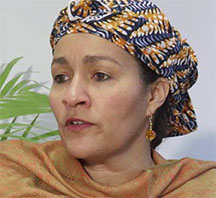By Amina Mohammed
At the turn of the century, the Millennium Development Goals (MDGs) represented a new approach to address by end of 2015 the greatest development challenges of that time. The goals in 2000 catalyzed the most successful anti-poverty initiative in history; it was a common framework that world leaders signed onto.
Over the last two decades, growth in the Caribbean has stagnated and many Caribbean countries have been vulnerable to external crises and shocks that have persistently constrained their development. Similar to other Small Island Development States (SIDS), growth of Caribbean countries are exacerbated by climate change, the volatility of the global economy and high and rising debt to GDP ratios. Caribbean countries are in need of a framework to build economic, environmental and social resilience and tackle prominent challenges in the region, including reducing poverty, inequality, vulnerability to climate change and natural disasters and financial sector weakness.

These challenges faced by Caribbean countries are local and in many cases exasperated by the global context. The world has drastically changed, with old challenges intensifying and new complexities increasing. These include unemployed youth, migration, conflict and natural disasters. To address this, since 2012, world leaders together with key stakeholders have been working on a new sustainable development agenda that will be adopted this year to tackle the existing and new challenges of our times.
Through a new set of transformative Sustainable Development Goals (SDGs) expected to be adopted by United Nations Member States in September, we will have a roadmap and the means to end extreme poverty and protect the planet. These goals as they evolve include the unfinished business of the MDGs. However, the integrated approach to realize social, economic and environmental progress for all will not be achieved by one person or institution alone, but will require the collective effort of all.
The new sustainable development agenda is a universal agenda, applying to all countries, while adaptable to countries’ circumstances. At a national and regional level, this will require a new narrative for countries and non-state actors. All players need to be fit for purpose.
Governments need to create incentives for private sector investment in countries for sustainable development; while businesses need to align their core business models with the SDGs and be accountable to people and planet. The United Nations is also gearing up to support countries in realizing this agenda at the global, regional and national level.
At the heart of this new agenda is the aim to improve the lives of everyone, everywhere and to leave no one behind. To ensure that economic growth translates into the well-being of all people, deep structural transformations are required, including investment in people. Young people and women in particular are the key to driving productivity, innovation and citizenship. As they are often at the nexus and forefront of many of the challenges to sustainable development on the ground, their active engagement and leadership in decision-making in delivering on the solutions will be critical.
The forthcoming Forum on the Future of the Caribbean in Port of Spain Trinidad to be held in May will engage international and regional policy-makers, think tanks, businesses and civic society leaders, academic experts and youth. Under the banner, ‘Disruptive thinking, Bold Action, Practical Outcomes’, participants will explore a shift in thinking to bring forward the creative solutions needed for complex problems, and deliver lasting change on regional priorities to create a resilient, home-grown yet international Caribbean future. I am excited and look forward to participating in the forum and contributing distruptively.
Young people in the Caribbean and elsewhere are the torchbearers of this new agenda. With the right partnerships and support, their generation can be the first to finally end extreme poverty irreversibly and the last generation to avoid the impacts of climate change. In 2015, people and leaders must agree to create equal opportunities for all people to contribute to improve the world for current and future generations. It’s time for global action for people and planet. Let’s make it happen.




